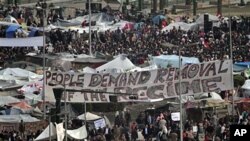After 14 days of massive protests against him, Egyptian President Hosni Mubarak remains in power and opposition groups doubt that talks with his government will resolve the country's crisis.
Their numbers are less than they were before, but the thousands of anti-Mubarak protesters camping on Cairo's Tahrir Square say they will not abandon their fight until Egypt's leader of nearly 30 years leaves.
Opposition groups say their talks with President Mubarak's government Sunday did not yield concrete results. They say the dialogue has not ended, but they are waiting for the leadership to make concessions before calling off the protests. The banned Muslim Brotherhood agreed to join talks for the first time.
President Mubarak has made concessions over the past week that include appointing a Vice President, announcing he will not seek reelection this year, and his party has seen the resignation of its top leaders.
The protesters and some in the opposition want him to leave power - and the country - immediately.
Egyptians on Monday woke up to another day of tension, but signs of normalcy are slowly returning to the capital. Banks reopened after being closed for days, and streets were for the first time in more than a week choked with traffic as people return to work.





